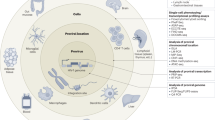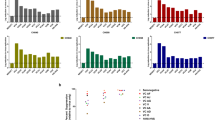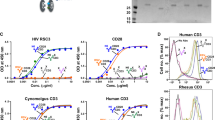Abstract
An effective acquired immune response to infectious agents mediated by HLA-restricted T-cell recognition can target different stages of disease pathogenesis. We show here that three distinct HLA alleles known to alter the overall rate of AIDS progression act during distinct intervals after HIV-1 infection. The discrete timing of HLA allele influence suggests alternative functional mechanisms in immune defense against this dynamic and chronic immunosuppressive disease.
This is a preview of subscription content, access via your institution
Access options
Subscribe to this journal
Receive 12 print issues and online access
$209.00 per year
only $17.42 per issue
Buy this article
- Purchase on Springer Link
- Instant access to full article PDF
Prices may be subject to local taxes which are calculated during checkout

Similar content being viewed by others
References
Carrington, M. & O'Brien, S.J. Annu. Rev. Med. 54, 535–551 (2003).
Goulder, P.J. et al. Nat. Med. 3, 212–217 (1997).
Nixon, D.F. et al. Nature 336, 484–487 (1988).
Kelleher, A.D. et al. J. Exp. Med. 193, 375–386 (2001).
Feeney, M.E. et al. J. Virol. 78, 8927–8930 (2004).
Altfeld, M. et al. AIDS 17, 2581–2591 (2003).
Leslie, A.J. et al. Nat. Med. 10, 282–289 (2004).
Goulder, P.J. et al. Nature 412, 334–338 (2001).
Pillay, T. et al. J. Virol. 79, 12100–12105 (2005).
Jin, X. et al. J. Virol. 76, 12603–12610 (2002).
Morb. Mortal. Wkly. Rep. 41, 1–19 (1992).
Morb. Mortal. Wkly. Rep. 36, 3S–15S (1987).
Goulder, P.J. & Watkins, D.I. Nat. Rev. Immunol. 4, 630–640 (2004).
Allen, T.M. et al. J. Virol. 78, 7069–7078 (2004).
Betts, M.R. et al. Proc. Natl. Acad. Sci. USA 102, 4512–4517 (2005).
Acknowledgements
This study has been funded in part with federal funds from the US National Cancer Institute (NCI), US National Institutes of Health (NIH), under Contract No. NO1-CO-12400, the US National Institute on Drug Abuse (DA 04334), and by the Intramural Research Program of the NIH, NCI, Center for Cancer Research. We wish to thank P. Goulder and C. O'hUigin for helpful discussions. The study was approved by the Protocol Review Office of the NCI institutional review board. Informed consent was obtained at the study sites from all individuals.
Author information
Authors and Affiliations
Corresponding author
Ethics declarations
Competing interests
The authors declare no competing financial interests.
Supplementary information
Supplementary Table 1
Effect of HLA class I alleles on AIDS progression in 1,089 seroconverters. (PDF 17 kb)
Rights and permissions
About this article
Cite this article
Gao, X., Bashirova, A., Iversen, A. et al. AIDS restriction HLA allotypes target distinct intervals of HIV-1 pathogenesis. Nat Med 11, 1290–1292 (2005). https://doi.org/10.1038/nm1333
Received:
Accepted:
Published:
Issue Date:
DOI: https://doi.org/10.1038/nm1333
This article is cited by
-
Transcriptome Sequencing of Peripheral Blood Mononuclear Cells from Elite Controller-Long Term Non Progressors
Scientific Reports (2019)
-
High polymorphism rates in well-known T cell epitopes restricted by protective HLA alleles during HIV infection are associated with rapid disease progression in early-infected MSM in China
Medical Microbiology and Immunology (2019)
-
A Reproducibility-Based Computational Framework Identifies an Inducible, Enhanced Antiviral State in Dendritic Cells from HIV-1 Elite Controllers
Genome Biology (2018)
-
MHC-I peptides get out of the groove and enable a novel mechanism of HIV-1 escape
Nature Structural & Molecular Biology (2017)
-
HIV-infected sex workers with beneficial HLA-variants are potential hubs for selection of HIV-1 recombinants that may affect disease progression
Scientific Reports (2015)



